Hard work still needed before Kim-Trump summit - US envoy
After Trump revealed the summit would take place in the Vietnamese capital
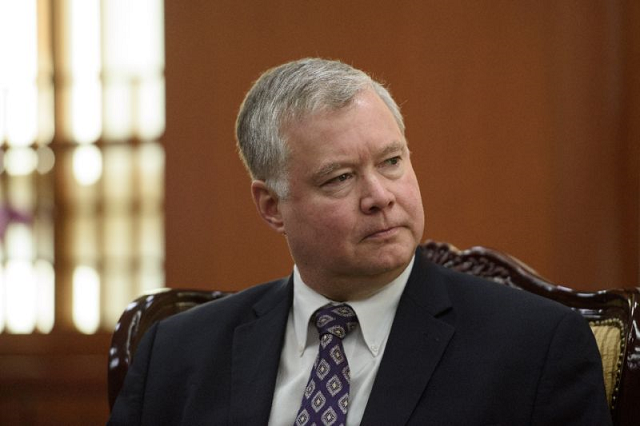
US Special Representative for North Korea Stephen Biegun said hard work remains to be done ahead of this month's summit between President Donald Trump and Kim Jong Un. PHOTO: AFP
Stephen Biegun, the US Special Representative for North Korea, said preparatory talks had been productive, but more dialogue was needed ahead of the summit scheduled for Vietnam from February 27-28.
Biegun on Saturday briefed South Korean Foreign Minister Kang Kyung-wha on his Pyongyang visit, shortly after Trump revealed the summit would take place in the Vietnamese capital, Hanoi.
Trump says summit with Kim to take place in Hanoi
"We have some hard work to do with the DPRK between now and then," Biegun told Kang, adding: "I'm confident that if both sides stay committed we can make real progress here.
Trump announced Hanoi as the location on Twitter, hailing as "very productive" the preparatory talks between diplomats from the two countries.
"I look forward to seeing Chairman Kim & advancing the cause of peace!" he said.
The State Department said talks during Biegun's three-day trip explored Trump and Kim's "commitments of complete denuclearisation, transforming US-DPRK relations and building a lasting peace on the Korean Peninsula".
It also confirmed Biegun had agreed to meet his North Korean counterpart Kim Hyok Chol again before the summit.
North Korea has yet to provide any official confirmation of the summit and Kim Jong Un appeared to make no mention of it during a meeting earlier with the top brass of the Korean People's Army.
As reported by state media, the meeting focused on the need to modernise the military while maintaining party discipline in the ranks.
Attention will now focus on whether the US team has offered to lift some economic sanctions in return for Pyongyang taking concrete steps toward denuclearisation.
Discussions on declaring an end to the 1950-53 Korean War could also have been on the table, with Biegun last week saying Trump was "ready to end this war."
The three-year conflict ended in an armistice, not a peace treaty, leaving the two Koreas still technically at war, with the US keeping 28,500 troops in the South.
Experts say the most likely scenario in Vietnam is that the concerned parties - North and South Korea, the US, and China - to declare a formal end to the war as a political statement.
At their landmark summit in Singapore last year, the mercurial US and North Korean leaders produced a vaguely worded document in which Kim pledged to work towards "the denuclearisation of the Korean peninsula".
But progress has since stalled, with the two sides disagreeing over what that means.
Experts say tangible progress on Pyongyang's nuclear weapons will be needed for the second summit if it is to avoid being dismissed as "reality TV."
On Friday Trump tweeted that North Korea will become a "great Economic Powerhouse" under Kim.
"He may surprise some but he won't surprise me, because I have gotten to know him & fully understand how capable he is," said Trump.
North Korea, under the leadership of Kim Jong Un, will become a great Economic Powerhouse. He may surprise some but he won’t surprise me, because I have gotten to know him & fully understand how capable he is. North Korea will become a different kind of Rocket - an Economic one!
— Donald J. Trump (@realDonaldTrump) February 9, 2019
But Park Won-gon, a professor at South Korea's Handong University, said Trump's remarks may not align with Pyongyang's current agenda.
"What Pyongyang wants now, more than anything, is the lifting of the existing sanctions," Park told AFP.
Can the second Trump-Kim summit end the Korean War?
"The idea of being an economic powerhouse may sound too vague and even unrealistic for them at this moment."
North Korea, which holds most of the peninsula's mineral resources, was once wealthier than the South, but decades of mismanagement and the demise of its former paymaster the Soviet Union have left it deeply impoverished.
In 2017 the UN Security Council banned the North's main exports - coal and other mineral resources, fisheries and textile products - to cut off its access to hard currency in response to Pyongyang's pursuit of nuclear weapons and ballistic missiles.



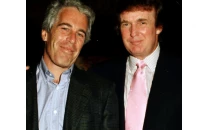
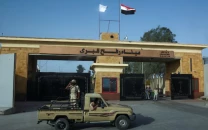
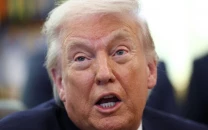
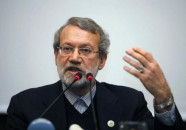












COMMENTS
Comments are moderated and generally will be posted if they are on-topic and not abusive.
For more information, please see our Comments FAQ